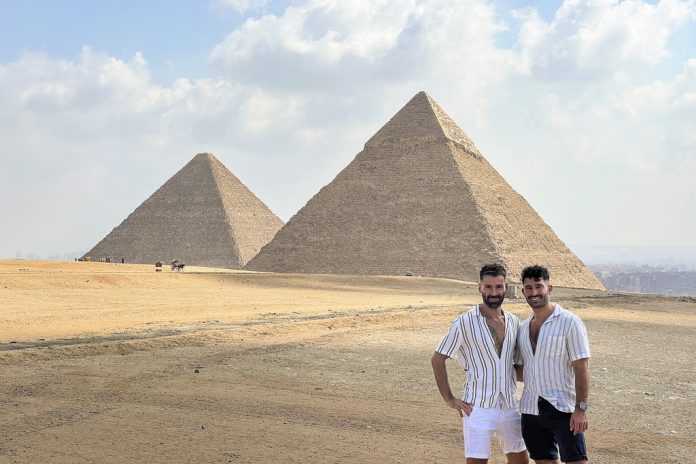NEW YORK (AP) — Do LGBTQ+ tourists have a green book-like system for staying safe while traveling in these politically precarious times? They don’t have one. They have many.
In recent years, there’s been an outpouring of specialized blogs, cruise and tour operators, and booking sites for accommodations. There are organizations that certify the support of transport operators, destinations and special events. And there are watchdog groups with eyes on the laws and customs of the world.
“People are concerned because we realize that our rights are under attack in some cases,” said Mark Chesnut, a New York-based travel writer and speaker with 30 years of experience in the industry. “People aren’t going to stop traveling. They’re just more careful and taking precautions. They’re choosing destinations wisely.”
Read reviews. Network with locals. Know the laws and customs of a destination, Chesnut and other seasoned LGBTQ+ travelers and their allies suggest. Is it illegal there to be gay? Is it a taboo that can get you killed? Is it safe to embrace or hold hands in public? What are the ramifications for HIV-positive travelers? How about misaligned documents and security scans for trans people?
The potential pitfalls are many for LGBTQ+ travelers, especially couples looking to express their authentic selves, advocates said. But the possible dangers should be weighed against the joys of discovering new places, said Stefan Arestis and Sebastien Chaneac, the globetrotting couple behind the travel blog the Nomadic Boys.
“We as gay people have to do that extra layer of research compared to my straight friends. They can hop on a plane and go,” said Arestis, a Greek Cypriot.
He and Chaneac, who is French, left their London jobs (the former a lawyer and the latter in tech) to make Cyprus their base. They turned more than a decade of extended travel into a detail-rich website and, this year, a handbook for LGBTQ+ travelers, “Out in the World: The Gay Guide to Travelling with Pride.”
Granular due diligence will help
Arestis said it was clear in 2014, when they began blogging about their year-long sabbatical in Asia for friends and family, that LGBTQ+ travelers were hungry for information.
“After about a year, we started getting random people coming to our site. We thought who are these people? Basically, they were googling things like where are the gay bars in Bali? Are there gay hotels in Shanghai? Is it safe to go to Taiwan? They were finding our content,” he said, because at the time there was little else about the subject online.
Arestis has visited 97 countries of all sorts. Chaneac doesn’t count but does have places he wouldn’t go out of safety concerns, including Kuwait and Saudi Arabia.
On their site and in their book, the Nomadic Boys tell it like they see it, with practical tips and a feel for political and cultural landscapes.
They had a scare in Lebanon, for instance, when they were told they were blacklisted while trying to leave the country. And among their book’s listings are these warnings about Peru: It “lags behind its more progressive neighbors” in terms of LGBTQ+ rights but introduced anti-discrimination laws in 2017.
“We advise caution over PDAs unless you’re in a gay-friendly environment. Having said that, Peru relies heavily on tourism so gay travelers will feel comfortable and welcome,” they advise.
The couple went on to note they had no problems getting a double bed in any of the hotels they used in the Peruvian towns of Barranco, Miraflores, Cusco, Arequipa and Lake Titicaca.
That level of detail and practicality is what drew Black travelers to green books during the Jim Crow era.
Friendly locales only or venture out?
Some other LGBTQ+ travelers prefer to stick with safer and more accepting locales, for comfort and as a boycott of sorts against hostile destinations. Others travel out of their comfort zones for adventure and to support local and often suppressed gay communities.
“It’s a really robust debate,” Chesnut said. “It’s a personal judgment and a personal decision that travelers need to make.”
Traveling can be particularly fraught for trans people.
Gabrielle Claiborne in Atlanta is co-founder and CEO of Transformation Journeys Worldwide, a training and consulting firm that works with Fortune 100 companies on creating cultures of belonging for trans and gender-diverse people. She’s also the chair of the International Gay and Lesbian Travel Association Foundation’s Transgender Advisory Group.
Claiborne is a trans woman who frequently travels globally. At 6-foot-2, and taller in heels, she often draws stares in security lines.
“I get a lot of people whispering and gawking, just by being present and being visible in that space,” she said. “The security checkpoint is triggering for trans people because of the experiences with TSA agents, from other people in the line.”
Some trans people have documents with photos and gender markers that don’t align. Going through security scanners can be troubling, Claiborne said. Agents must press a button designating male or female.
“If they pressed the wrong button and an area of our bodies is flagged, we have to go through a very triggering pat down,” she said.
Claiborne doesn’t support boycotts of unfriendly destinations.
“We have a long way to go, yet I’m optimistic about the progress that is being made,” she said. “The reality is we make progress when people are willing to stand up and be visible. Until we’re visible in a space where we might be the only one like us in the room or in that space, people are not going to know what they don’t know.”
Source: post





